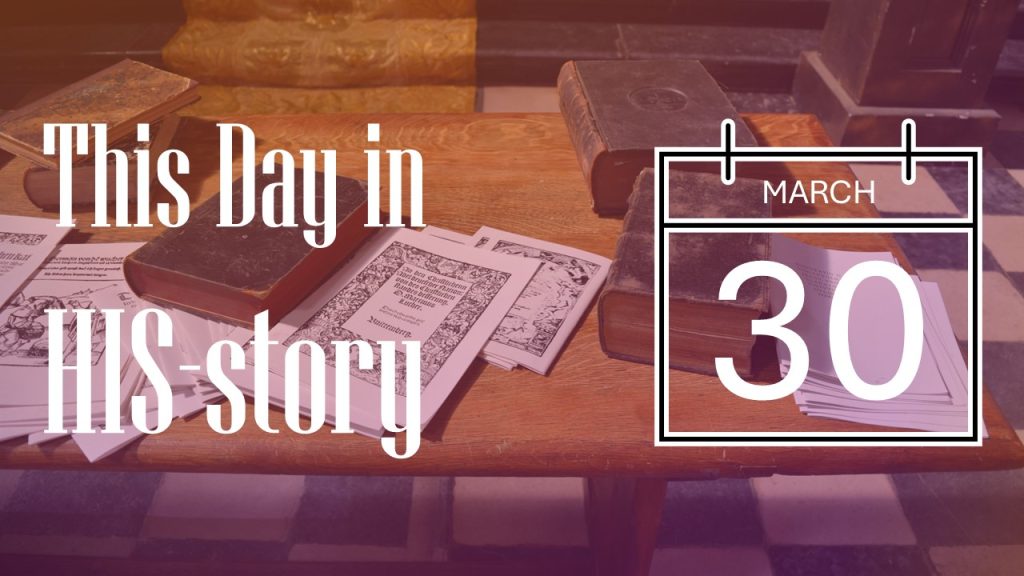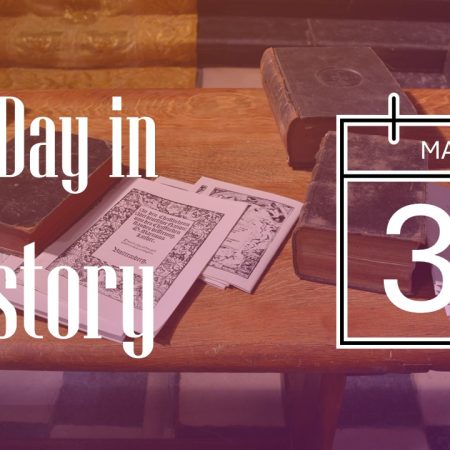
1533
When Thomas Cranmer learned he had been named Archbishop of Canterbury by King Henry VIII, he balked. Visiting Germany at the time to promote the King’s interest in a divorce, he dawdled seven weeks getting back to England. Although the King’s word was law, Cranmer hesitated to accept the position.

The English church was in a turmoil over the question of Henry’s desired divorce from Catherine. Having presented him with no male heir, the queen, once so charming to Henry, was now repugnant. Yet he could not get the Pope to agree to an annulment.
Cranmer had come to the King’s attention when, in conversation with two of Henry’s men, he had suggested that the universities could just as well settle the question as the Pope. Henry swore Cranmer had “the right sow by the ear.” He earmarked the priest to become Archbishop of Canterbury, England’s highest religious post. Cranmer was consecrated on this date, March 30, 1533.
Believing himself subject to the King, Cranmer promptly granted Henry the annulment. Throughout his tenure as archbishop, he would do pretty much whatever the King commanded. Henry’s continual shifts of policy often made Cranmer appear wishy-washy. For example, he ruled Henry’s marriage to Anne of Cleve lawful and six months later annulled it as unlawful.
Already leaning toward Protestantism, Cranmer became the chief architect of the English Reformation. He urged the King to place Bibles in England’s churches and it was done. He wrote the first Book of Common Prayer. In only a few things did he resist Henry. At some jeopardy to himself, he pleaded for the lives of Thomas More and Bishop Fisher and testified for three days against Henry’s Six Articles which went back to Roman Catholic forms. However, he sat with the persecutors of John Frith and Joan of Kent, both of whom were executed by fire.
By his twisting and turning, Cranmer escaped execution under Henry. Henry trusted him above all his other prelates and on his deathbed clung to Cranmer’s hand. Under Edward, Cranmer advanced Protestantism, helping draft doctrines which became the basis for the Church of England’s Thirty Nine Articles.
Under pressure, Cranmer supported Lady Jane Gray to succeed Edward. It was not to be. Mary took the throne and charged him with treason and heresy. In face of death he recanted his Protestant opinions. When he learned he was to die anyway, he publicly renounced his recantation. “As for the pope, I refuse him, as Christ’s enemy and Antichrist, with all his false doctrine.” When the fire was lit, he held the hand that had signed the recantation into the flame, burning it off before the fire touched his body, saying, “This unworthy right hand.” As death approached he repeated several times, “Lord Jesus, receive my spirit.”
1735
At midnight when I would see lightening in the sky or the Northern Lights, my soul would be ready to burst my body with joy, being in hopes Christ was coming to judgment.” So wrote Howel Harris, expressing the freshness of his delight in Christ after his conversion.
March, 1735 marked the beginning of his turn toward God. Although a divinity student, planning to enter the ministry, he had not experienced the life of Christ within him. On the contrary, he was a wild and inconsiderate youth, troubled by twitches of conscience, perhaps, but lacking the principle of spiritual life. Later he would say, “I can’t reckon anyone safe until he has the indwelling of God in him.”

But on this day, March 30, 1735, Pryce Davies, Vicar of Talgarth, preached a sermon upon the duty of partaking of the Lord’s Supper. Little could Davies have anticipated the importance of that sermon. Howel was so moved that he resolved to change course and lead a new life. The following Sunday, April 6th of 1735, he partook of the Lord’s Supper. But Howel’s conversion was not yet complete.
God used a book to open Howel’s eyes to his need for a savior. That book was Richard Allestree’s The Whole Duty of Man. It brought Howel to a deep sense of sin and of his need to have a share in Christ. Partaking of the sacrament on April 20th, he experienced an assurance of pardon for all that he done wrong. Temptations followed. Finally on June 18, 1735, he discovered peace in the gospel assurance that God is unchanging. Howel described his new assurance as being “sealed.” He felt compelled to tell others about God’s kindness, and was sure doors would open to permit him to do so.
He began work at once by leading family devotions at home. Soon neighbors were joining him for prayer. After a term at Oxford, he returned home early in 1736 to begin spreading the gospel vigorously. God seemed to be with him. The results were amazing. “He found a nation slumbering; he left it awake,” wrote H. Elvet Lewis.
Howel often preached five sermons a day. Gifted with a strong voice and a commanding personality, he displayed great earnestness in preaching against sin and warning of the judgment that is coming on all men. Within a few years, he had preached to the entire principality of Wales. Thousands who heard him became followers of Christ. Although never ordained, Howel Harris became a founder of Welsh Calvinistic Methodism, and an inspiration to another notable evangelist–George Whitefield.
Hostile mobs and attempts on his life did not slow him down. Neither did rejection by the Church of England, which was uneasy with his enthusiasm. That he kept his enthusiasm all of his short life is confirmed by the diary he wrote. “I sang and triumphed all the way through the streets to the tower.” He wept easily and longed for the work of the Holy Spirit in all men. “Seeing from the top of a hill the country and plain all before me, I was under such an influence that I could not help crying and pleading for all being filled with love.”
1799
HT: Dan Graves
Friedrich August Gottreu Tholuck entered the world on this day, March 30, 1799 in Breslau, Prussia (later in Poland). His father was a goldsmith and the family expected the son to become a craftsman, too, but Friedrich was so awkward that prudence suggested he find work in some other field.

Clearly he was meant for the life of a scholar, for by the time he was sixteen years old, he was well on his way to mastering nineteen languages. As an adult, he spoke English, Greek, Arabic, Italian and French almost as well as his native German.
But the boy was a skeptic. He claimed to find Islam more attractive than Christianity. However, personal encounters with the vibrant Christianity of Schleiermacher, Neander and a Moravian baron led him to become an evangelical Christian. His took evangelist Count von Zinzendorf’s motto as his own: “I have but one passion and that is He [Jesus] and He alone.”
Appointed to teach at Halle, he faced opposition from fellow faculty members who were rationalists. But it was Friedrich’s warm Christian spirit that prevailed over their coldly analytical thought: the entire faculty became evangelical.
At that time, skepticism and rationalism prevailed in German universities. Leading German theologians and thinkers ripped apart the Scriptures using higher criticism. Friedrich did not escape this influence, but it did not lead him into the heresies of most theologians. This was because he genuinely loved Christ Jesus.
Friedrich’s love of Christ inspired him to make it his main aim to lead his students to personal faith in the Savior. His way of pressing home truth can be seen in his comment on Christ’s prayer on the cross, “Father forgive them, for they know not what they do.” Friedrich exclaimed, “How do these words on the Cross call to us, in God’s name, not to make light of sin!” He invited his students for meals and took long walks with them. Several became notable theologians in their own right; men such as the teacher-theologian Charles Hodge remembered him with respect.
Friedrich wrote a number of books. The best-known may have been his commentary on the Gospel of John. Church historian Schaff says “his learning was extensive rather than thorough or exhaustive.” He was “original, brilliant, suggestive, eloquent and full of poetry, wit and humor.”
1858
Dudley Tyng speaks to a noon rally of five thousand in Philadelphia, taking as his text, “Go now ye that are men and serve the Lord.” He declares that he would rather lose his right arm than fail to deliver God’s message to his listeners. Deeply moved, one thousand men respond to his solemn words.

Two weeks later one of his arms is yanked from its socket in an accident, infection will develop, and it will have to be amputated. These measures will not save him and in a few days more he will die. His last words will be “Stand up for Jesus, father, and tell my brethren of the ministry to stand up for Jesus.” This dying exhortation will inspire the hymn “Stand Up, Stand Up for Jesus.”
